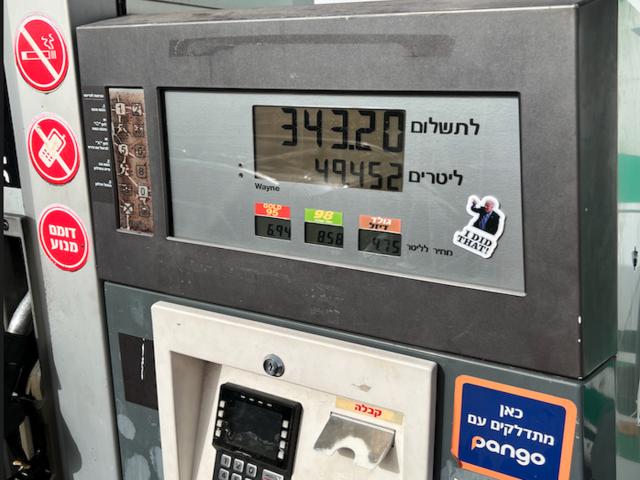In a much-anticipated move, the Ministry of Energy and Infrastructure has announced a reduction in the maximum price of government-controlled 95 octane gasoline at self-service pumps across Israel. At the stroke of midnight on Wednesday, August 1, prices will drop by NIS 0.08 per liter, bringing the cost down to NIS 7.48 per liter. This price cut, though seemingly modest, is a welcome respite for Israeli consumers amidst a backdrop of fluctuating fuel costs and regional unrest.
The announcement reiterates the unchanged NIS 0.22 per liter service charge at the pumps, maintaining a degree of consistency for motorists.
Historical Context of Fuel Price Fluctuations
This latest reduction follows a brief period of volatility in gasoline prices. At the beginning of July, prices saw a slight increase of NIS 0.04 per liter. Conversely, June marked the first price decrease in 2024, hinting at a potential trend reversal. However, May witnessed a peak with prices reaching NIS 7.90 per liter, alarmingly close to the all-time high of NIS 8.25 per liter recorded in 2012.
Fiscal Policies and Their Impact
The Israeli government's decision earlier this year to halt its policy of reducing the excise tax on fuel has been a pivotal factor. This policy shift aimed to address the widening fiscal deficit and the substantial costs incurred from ongoing conflicts. The cessation of this subsidy, which had kept prices just below NIS 7 per liter, has saved the state nearly NIS 2 billion from April 2022 to December 2023.
Global Oil Market Dynamics
Meanwhile, U.S. crude oil futures experienced a notable decline of nearly 2% on Monday. This drop occurred despite the looming threat of escalating conflict between Israel and the Iran-backed militia Hezbollah.
West Texas Intermediate (WTI) crude for September delivery closed at $75.81 per barrel, down $1.35, or 1.75%. Year-to-date, WTI has posted a gain of 5.8%. Similarly, Brent crude for September delivery fell to $79.78 per barrel, a decrease of $1.35, or 1.66%, though it remains up by 3.6% year-to-date. RBOB Gasoline for August delivery also saw a decline, closing at $2.41 per gallon, down 4 cents, or 1.84%, with a year-to-date increase of 14.9%. Natural gas prices for August delivery dropped to $1.90 per thousand cubic feet, down 9 cents, or 4.94%, reflecting a significant year-to-date decrease of 24.1%.
Regional Tensions and Their Influence on Oil Prices
The geopolitical landscape continues to exert pressure on global oil markets. A tragic incident over the weekend saw a rocket fired from Lebanon, reportedly by Hezbollah, killing 12 children in the Israel-occupied Golan Heights. Israel's government has blamed Hezbollah for the attack, although the militia has denied involvement. In response, Israel's security Cabinet has granted Prime Minister Benjamin Netanyahu the authority to determine the appropriate military response.
Despite these tensions, the global oil market's reaction has been relatively muted. Earlier in the spring, fears of an all-out war between Israel and Iran had driven oil prices higher. However, without a significant disruption to oil supplies, market responses have since stabilized.
Conclusion
The reduction in gasoline prices is a beacon of relief for Israelis who are already managing through inflation on a variety of goods and other economic issues stemming from the war which Hamas began on October 7, 2023. As the geopolitical landscape continues to evolve, the interplay between local policy decisions and global market dynamics will remain crucial in shaping the economic outlook for Israel and beyond.


